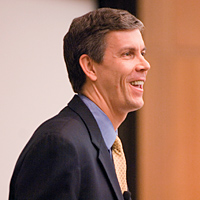Introducing Arne Duncan, Next Secretary of Education
Blog Post
Dec. 15, 2008
 After more than six weeks of hand wringing and hypothesizing, the education community finally has its answer - Arne Duncan, current CEO of Chicago Public Schools (CPS), will be the next Secretary of Education.
After more than six weeks of hand wringing and hypothesizing, the education community finally has its answer - Arne Duncan, current CEO of Chicago Public Schools (CPS), will be the next Secretary of Education.
Reception of this announcement has been primarily positive. Duncan appears to straddle the current divide in education thought in the Democratic party - he purports to be both a reformer and a uniter, supporting accountability, charter schools, new investments in education, and improved teacher training.
But what does a Duncan appointment mean for the federal government's involvement in education? Hopefully his past work in Chicago can shed some light.
Since 2001, Duncan has overseen serious changes at CPS, including the creation of several new programs. These programs provide a glimpse into Duncan's priorities for education, perhaps foreshadowing what is to come during No Child Left Behind (NCLB) reauthorization.
Duncan has long been a supporter of charter schools in Chicago. And while he hasn't been able to grow the city's 30 charter school cap, he has created a system that supports charter schools and the innovations surrounding them. To their credit, recent research suggests that students in Chicago charter schools are more likely to graduate high school than students in traditional CPS schools. We expect that Duncan will continue his support of charters as Ed Secretary.
Duncan has also aided in the creation of the Teacher Residency Program in Chicago. Originally conceived by Duncan and Mayor Daley as a summer fellowship program, the program places pre-service second career teachers in CPS classrooms under the guidance of veteran teacher mentors. It represents an alternative method of bringing bright and motivated teachers into urban classrooms. The program has demonstrated anecdotal success in Chicago and served as a model for the Teaching Residency Program pilot recently written into the reauthorization of the Higher Education Act. The initiative was originally proposed by Obama in the Teaching Residency Act. Duncan's creative take on teacher training and induction is relevant to the future of NCLB's Title II. Hopefully reauthorization will include more innovative programs to encourage professionals to enter teaching.
Speaking of higher education, Duncan started CPS' Postsecondary Education and Student Development department, which connects high school students with programs for college planning and preparation, workforce experience, and leadership training. The department also oversees the district's AVID, GEAR UP, and college mentoring programs. Both AVID and GEAR UP provide support and academic services to disadvantaged students who hope to attend college. The mentoring program connects CPS students with trained mentors and coaches who serve to guide them on a college-going path. College readiness is sure to be a major issue in NCLB reauthorization and Duncan's emphasis on preparation and early intervention are encouraging.
Obama's primary higher education proposal has been a $4,000 tuition tax credit for students in exchange for 100 hours of community service. Community service also appears to be a Duncan priority. CPS began to phase in a service learning graduation requirement in 2002. Service learning combines community service with curricula while increasing students' social, civic, and academic skills. CPS requires students to complete 40 hours of community service and places a Service Learning Coach on every high school campus. The coaches help students craft service learning projects and implement them over time. National service may be incorporated into Duncan's education agenda, as well.
As CEO of CPS, Duncan also nurtured relationships with researchers, particularly those at the Consortium on Chicago School Research. Not only has the Consortium created Chicago's early indicator system, which is used to identify high school freshman who are likely to struggle in or drop out of high school, it also administers the Improving Chicago's Schools survey. Survey results are used to provide school leaders with information on teacher, student, and parent perceptions of school climate, instruction, and leadership. Hopefully, Duncan will continue to support education research and increase funding for it beyond one half of one percent of the education budget.
Duncan is also considered a strong supporter of accountability. He helped craft an agreement with the teacher's union for a pay for performance pilot program starting in the fall of 2008 in ten CPS schools. Teachers who pass performance reviews and whose students perform well on standardized tests can earn an average of $2,000 in extra pay. In addition to providing teachers extra incentive to make sure their students are learning, the program increases the use of data-driven instruction in schools. Duncan's persistence and work with the teacher's union suggests that he can use consensus-based decision making to push through innovative and experimental programs.
Finally, Duncan has been a supporter of flexibility and accountability in undertaking NCLB requirements. Duncan struck a deal with the Department of Education to allow CPS to provide students with relevant and well-aligned supplemental education services (SES), despite statute limitations for districts identified as "in need of improvement." In exchange for SES status, the district tracks student participation and success in the program, providing one of the few sources of data on the provision of SES. While somewhat controversial, this program has been well received by parents and has high participation rates.
While we can glean some details from his past at CPS, much is still unknown about Duncan. However, the initial support he has received from various education stakeholders suggests that some real, positive change on issues of teacher training and accountability, data use, education research, and college readiness, to name a few, is on its way.